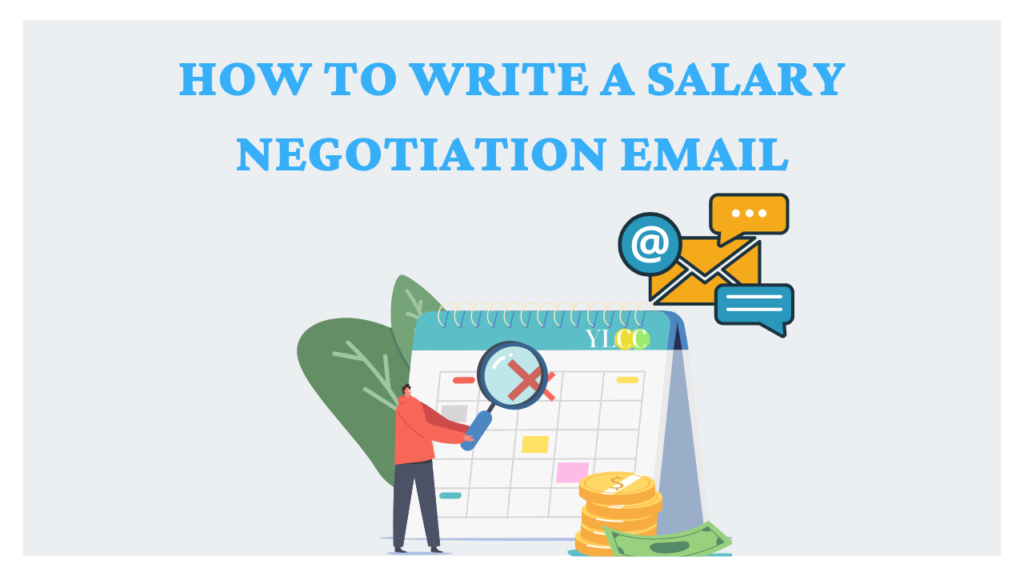
What Is A Salary Negotiation Email?
A salary negotiation email is one that candidates send to a potential or existing employer to begin negotiations on the initial salary offered for a role or to negotiate the current salary in case of an existing employer. Although salary negotiations may sometimes be uncomfortable, it is important to develop the skill for professional growth and to earn in accordance with your skills and work experience.
In this article, Team YLCC provides a detailed guide on how to write a professional salary negotiation email that creates an impact. Read on!
Things To Keep In Mind While Negotiating Salary Via Email
As opposed to in-person communication, negotiating your pay via email can be tricky as there is no way to assess what the other person is thinking. Here are some important tips that you can consider while engaging in the same.
- TAKE THE TIME YOU NEED
Hurrying is strongly discouraged. As a candidate, it is important to give yourself the adequate time that is required to peruse, assess and analyse the offers that the recruiters have given you that includes, among other details, the remuneration package and the base salary component. Once you have completed this step to your satisfaction, you may go ahead with the next step.
- CONDUCT THOROUGH RESEARCH
Before you move forward with negotiations, it is important to exactly what you are worth. Go to reliable online sites such as Glassdoor or Ambition Box and check the industry standards for your role and location. If you find that your initial offer matches such standards, the scope for negotiation is likely to be little to none. However, if the offer is below par, this is worth mentioning to the employer. Furthermore, if you believe you deserve remuneration that is above par, this may also be taken up with the recruiter in the course of negotiations.
- REMAIN AWARE OF YOUR TONE
A massive drawback of email communication is the greater chances of miscommunication. If anything is unclear or could come across as confusing, make sure you simplify the language as much as possible, without altering the language. The most important thing is to stay polite and enthusiastic while portraying a strong interest in the offer even while you are negotiating.
- KNOW AND CONVEY YOUR VALUE
The correspondence for salary negotiation is an opportunity to show the value that you bring to the table and why giving you a higher pay may be well worth it. You may do this by including the number of years in experience, any special certifications pertaining to the field or any specific skills relevant to the role. For example, you may want to emphasise your leadership skills or industry specialisation skills.
- CONSIDER YOUR OWN EXPENDITURE
If the offer from a potential employer requires you to relocate and incur other additional costs, make sure to include this in the negotiation. However, anything you mention should have a direct relationship with accepting the job. For example, do not mention the daily travel expenses for attending office- this does not make sense.
- NEGOTIATE IN OTHER FORMS, IF NECESSARY
If the recruiter makes it clear that the base salary is not negotiable, you may consider asking to review the additional benefits included in the package. Employers may find it difficult to increase the salary but may have a more flexible approach in reviewing the other options of the remuneration as part of the negotiation. Use this to your advantage.
- BE PREPARED WITH FURTHER NEGOTIATIONS
Very rarely do recruiters give in to your first negotiation email. As a candidate who is negotiating pay, you must be prepared for multiple discussions until both you and the recruiter can reach consensus. Depending on the role and industry, this may take quite some time. It is essential to be patient, professional and more importantly polite in your approach during this time.
How To Draft The Salary Negotiation Email
- PROFESSIONAL TONE
When composing an email for salary negotiations, start on a professional tone. It is important to include the full name of the person you are addressing the email to. In most cases, this is the hiring manager or recruitment adviser you have been dealing with.
On the contrary, if you are seeking to negotiate your pay in a current role, this may be your current manager.
- CREATE A CLEAR SUBJECT TITLE
The subject line is for setting the overall note for the correspondence. While making sure the subject line is relevant, it is important not to include salary in the subject itself.
For example, ‘Response To Your Officer of Junior Associate position’ is something that gives the essence of the communication but also does not point to the salary aspect.
- NAILING THE APPROPRIATE GREETING
Be professional by using an appropriate greeting. Depending on your initial interactions, this may be formal, for example, Dear Mr. Mittal, or informal, such as, Hello, Rajesh. Use your experience to determine the most appropriate greeting. If in doubt, opt for formal. If emailing your existing manager, the greeting, once again, depends on your relationship.
- THANKING THE EMPLOYER FOR THEIR OFFER
Instead of directly jumping into salary negotiations, it is important to thank the employer and outline your excitement for the opportunity.
- BE SPECIFIC ABOUT WHAT YOU ARE LOOKING FOR
When responding to the salary offer, it is important to be specific about what you are looking for. Having a specific number in mind or a salary range is a good idea prior to starting negotiations. Be upfront, so each side knows if it is possible to move forward in a professional manner. If you would prefer not to be specific, clearly state that the salary doesn’t meet your expectations. In such cases, the employer is likely to clarify whether or not there is an opportunity to review.
- EMPHASIZE ON YOUR EXPERIENCE AND QUALIFICATIONS
As aforementioned, it is important to show your worth at the first stage of the negotiations to give you a strategic upper hand and to convey your value in the mind of the recruiter. Think about five or six things you know you could excel at in the role and write them down to help create specific examples to include. The better your case for increasing the salary offer, the more reasonable your request may seem.
- ENDING THE EMAIL ON A POSITIVE NOTE
Sign off the email by again reiterating your genuine interest in the role. That way, the employer knows it’s worthwhile to try to make your request work. Thank them again for the offer and confirm the next steps. For example, I look forward to hearing from you via phone or email to discuss further. Include your full name in the sign-off for clarity and a professional appearance.
YLCC would like to thank the Content Team for their valuable insights in this article.






